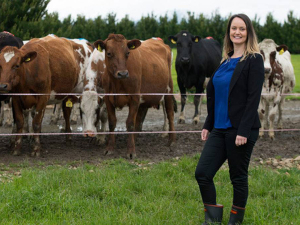Farmer confidence dips slightly, but positivity still dominates
Farmer confidence has taken a slight dip according to the final Rabobank rural confidence survey for the year.
 Rabobank analyst Emma Higgins warns that rocketing input costs and crimped production in some regions will not translate into new benchmark profits.
Rabobank analyst Emma Higgins warns that rocketing input costs and crimped production in some regions will not translate into new benchmark profits.
While there are predictions that NZ's farming sector could be in for a bumper year on the prices front, there's a warning to 'put the champagne on ice'.
"While many sectors are tipped for record commodity prices once more in 2022," warns Rabobank NZ analyst Emma Higgins, "rocketing input costs and crimped production in some regions will not translate into new benchmark profits."
She adds that exporters will need to navigate high shipping costs and challenging logistics to get product to market to secure profitable returns for New Zealand farmers.
Higgins points out that costs of farm inputs are likely to remain elevated over the year. However, she says there are signals of improvement with urea prices easing from record price levels.
"We see some possibility of a further decline - albeit slow - in urea prices over the next six months."
Meanwhile, Higgins believes any improved cash flow from profitable seasons is important for helping shape the NZ ag sector's response to more challenging times ahead.
"Pressure on NZ agriculture to contribute to the broader climate and environmental cause continue," she adds. "Now is the time to hold a broader discussion on future land use, farming systems and the role of technology in New Zealand agriculture."
She says the speed and extent of changing land use from pastoral farming to forestry needs to be addressed this year to deliver the appropriate form and scale of afforestation the country requires.
"We must establish a pan-sectoral strategy linking our obligations for low-methane farming with positive environmental, social, and economic outcomes for future generations," Higgins adds.
"NZ ag has the unique opportunity to be true world leaders for solving the global methane issue in a way that is good for both farming businesses and the environment."
Change Is Coming
Emma Higgins says farmers seeking greater clarity on fresh water, climate change, and biodiversity regulations in 2021 were left wanting.
"The complexity of these issues has only deepened, and the challenge of creating a coherent and pansectoral regulatory framework has grown considerably," she adds.
"Regulatory milestones for farmers to be aware of in 2022 include a final decision on an emissions pricing mechanism for agriculture's GHG emissions and the announcement of the Government's first emissions budget, which will set the pathway for meeting 2050 targets."
Higgins says the emissions budget will be hugely important because it will set out the policies and strategies to reduce GHG emissions in New Zealand in line with the 2030 and 2050 targets.
"Of particular interest is whether the Government will revise current policy settings that strongly incentivises the planting of pine trees over natives, in order to achieve the scale and form of afforestation as recommended by the Climate Change Commission."
She says the coming year will still include a level of uncertainty.
Herd improvement company LIC has posted a 5.2% lift in half-year revenue, thanks to increasing demand for genetics.
According to the latest Fresh Produce Trend Report from United Fresh, 2026 will be a year where fruit and vegetables are shaped by cost pressures, rapid digital adoption, and a renewed focus on wellbeing at home.
The Roar is a highlight of the game hunting calendar in New Zealand, with thousands of hunters set to head for the hills to hunt male stags during March and April.
OPINION: The past few weeks have been tough on farms across the North Island: floods and storms have caused damage and disruption to families and businesses.
European dairy giant Arla Foods celebrated its 25th anniversary as a cross-border, farmer-owned co-operative with a solid half-year result.
The sale of Fonterra’s global consumer and related businesses is expected to be completed within two months.

OPINION: Meanwhile, red blooded Northland politician Matua Shane Jones has provided one of the most telling quotes of the year…
OPINION: This old mutt has been around for a few years now and it seems these ‘once in 100-year’ weather…